The story of Cinderella exists in thousands of different versions worldwide. The protagonist is always a young woman who lives in forsaken circumstances which are suddenly changed to good fortune, with her ascension to the throne via marriage. And of course, there’s an Icelandic Cinderella: Mjaðveig Mánadóttir
The oldest version is the story of Rhodopis which was recounted by Greek geographer Strabo between 7 BCE and 23 AC. It tells the story of a Greek slave girl who marries the king of Egypt.
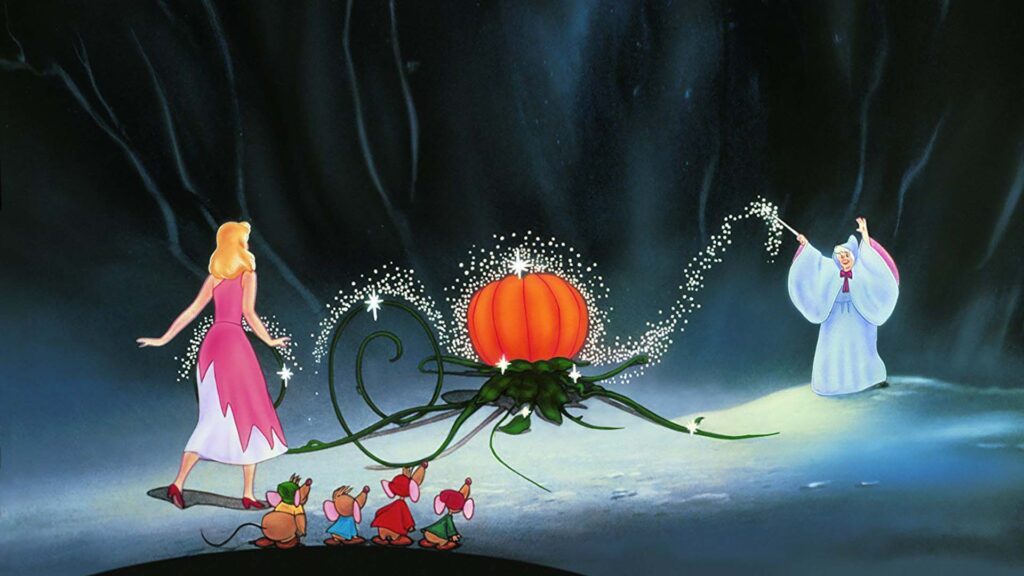
The most famous tale, in the Western world at least, is the Walt Disney animated version released in 1950. The film is based on the Charles Perault version published in 1697. The Grimm version, published in the 19th century, is much more brutal. Doves picked out the step-sisters’ eyes and left to live the rest of their lives as beggars.
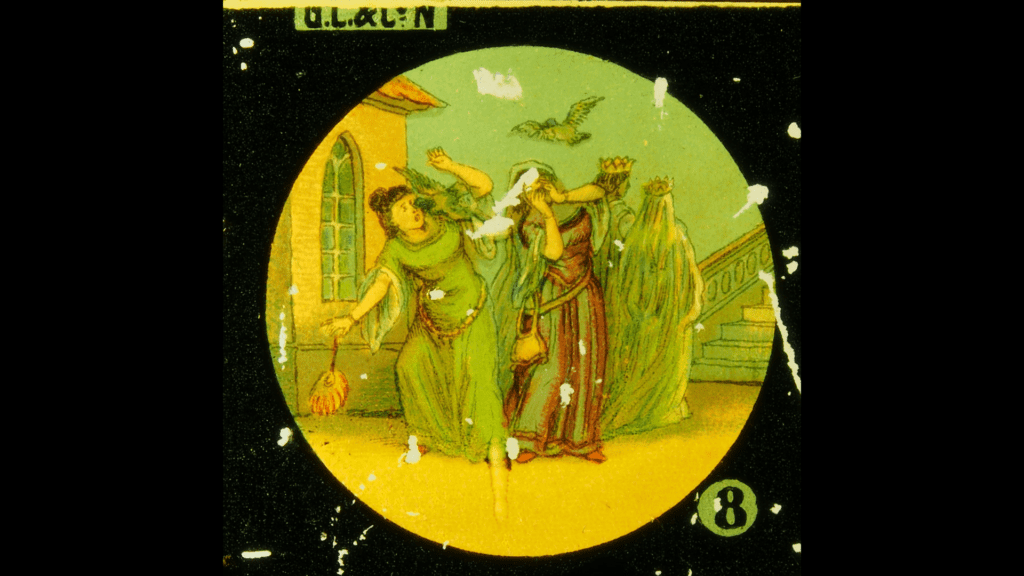
The Icelandic Cinderella tale tells the story of Mjaðveig, daughter of King Máni. The tale includes trolls, enchantments, cannibalism and golden slippers. It is a fun ride!
Read other legends and fairytales:
- Sæmundir the Learned and the Devil
- The Shepherd of Silfrúnarstaðir
- The Genesis of the Hidden People
- The Deacon of Myrká
- The Tales of Búkolla
- White Cap
- Dear Mother in the pen, pen
- The Bishop and The Elves
- Katla’s Dream
- Now I should laugh if I were not dead!
- The Story of Bergþór of Bláfell
- The Merman
- Móhúsa-Skotta
- “The Darkness is Fun”
- The Sorcerers in The Westman Islands
- The Two Sigurds
- The Merman
- The Manservant and the Water-Elves
- Gold Brow
- Úlfsvatn
The Story of Mjaðveig Mánadóttir
It is told that, in the days of yore, a king named Máni governed a certain realm. He had by his queen, a daughter called Mjaðveig, who in early youth was distinguished in all the accomplishments that became a lady of her rank. The king built a fine and costly bower for her and surrounded her with many a maids-in-waiting. But now it happened that the queen, her mother, fell sorely sick and died.
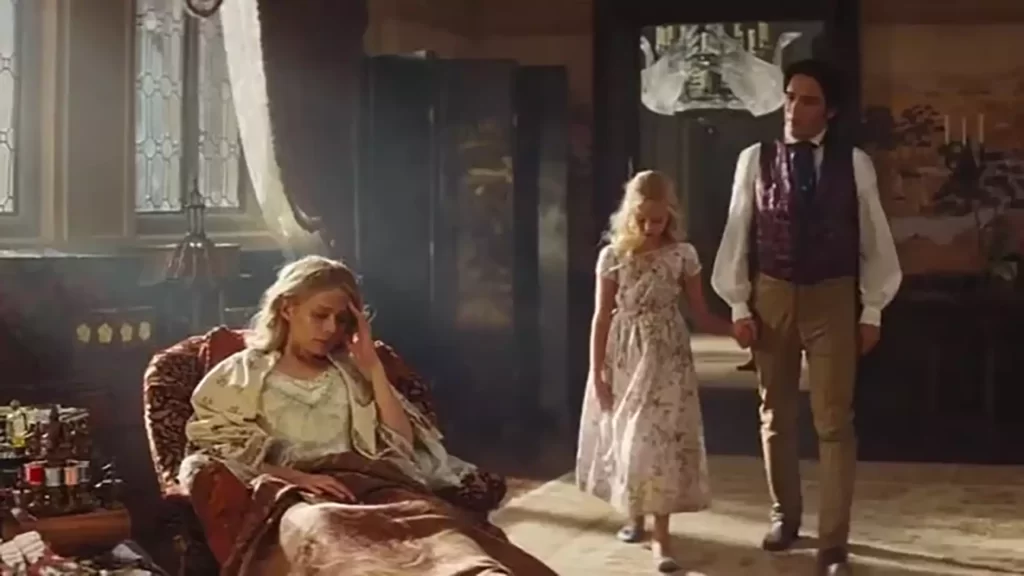
After her death, the king was so filled with sorrow that he kept to his bed almost every day and assuredly took no care of the concerns of his realm. His minister finding everything in the government going desperately wrong advised him to seek a fitting consort. He then decided to send two of his ministers out to find him one. He gave them a splendid suite and fitted them out right royally, and they then put to sea. But at sea, they were overtaken by fogs and, losing their course, knew not where they were or whether to go.
A New Queen is Wooed
At last, they saw the land and steered their vessels thither. They did not know the country but nevertheless put to shore, where an immense wilderness was opened to their view. Through this, they wandered in search of human dwellings but found none. At last, they heard a harp playing, so fine that they had heard nothing like it before, either in beauty or strangeness.
They turned their steps towards the sound until they came to a place where they saw a little tent, inwoven with silk. Hurrying to it, they saw a lady sitting in the tent. She was the one who had drawn from the harp the beautiful tones that had attracted the strangers, and at her side, a young girl sat. When the lady saw the men, she was so startled that she dropped her harp and fell into a swoon. But, as soon as she had recovered, she asked them whether they were traveling and why they were there.
They said they had missed their course on the sea. Having been sent by King Máni in search of a consort for him, as he had lost his queen and was in deep sorrow for the bereavement. The king’s advisers found this lady very charming. And accordingly asked her who she was and what were the events of her life. The lady answered their questions by saying she had once been a queen in that country. An overwhelming enemy had invaded it and, having laid waste the land, had slain the king in a brutal battle. After that, the leader’s plan was to conquer the country and marry her. This, however, had been so much against her will that, to avoid him, she had taken flight into this wilderness with her daughter and intended to await her doom.
All these the king’s advisers found to suit well their views. Deeming this to be a fitting match for King Máni, wooed the lady for the king. She gave a slow answer, saying that she had little employed her thoughts on marriage, but she finally yielded to their entreaties.
So, she embarked with them, and a fair wind they had to the realms of King Máni. When people saw the ships approaching the shore, the king drove in his state carriage down to the beach. No sooner had he caught a glimpse of his affianced bride than all his former sorrow was gone. He returned glad to the castle, and great preparations were made for a grand wedding feast, which lasted for a fortnight. When the dinner was over, the king went on a progress, claiming the forgotten taxes of his dominions.
Mjaðveig Mánadóttir
Now the story turns to Mjaðveig, the daughter of Máni.
One day, while she dwelt in her bower, the queen came to her. She told her that she found the loneliness of the court annoying and proposed a walk outside the town to divert them. She asked Mjaðveig to go with her, which she was willing to do. The queen, too, allowed her daughter to go with them. Now they walked, all three together, and the queen was very kind to her stepdaughter.
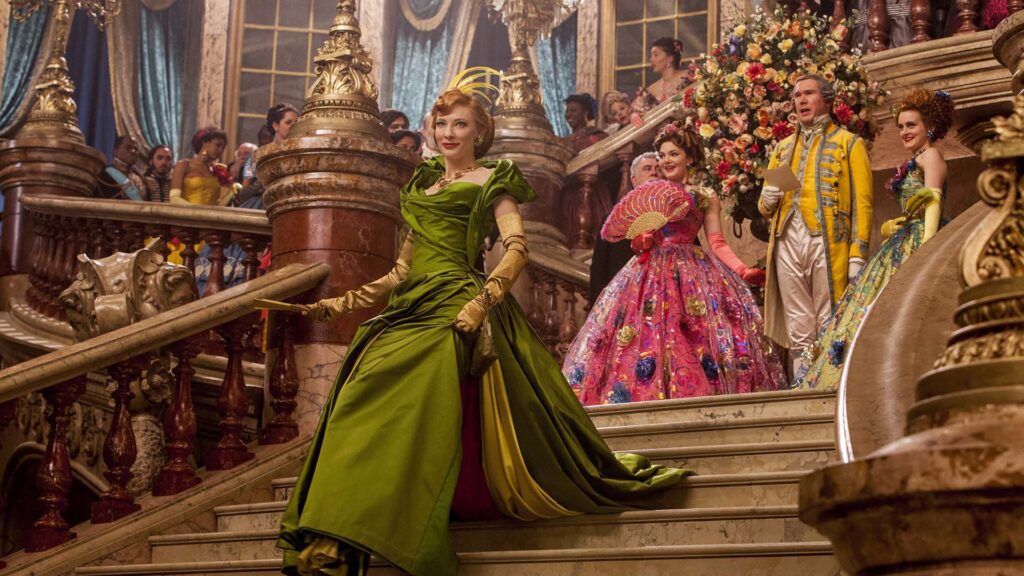
But when they had gone a good way out of the town, the queen asked Mjaðveig to change dresses with her daughter. So Mjaðveig took off her dress and gave it to them (the queen’s daughter, taking hers in exchange. When this was done, the queen said: “Now do I put that charm on you, that my daughter shall so have Mjaðveig’s face, and look, and mien, that no one may be able to tell one from the other.”
Then the queen and her daughter bound Mjaðveig, hand, and foot, leaving her helpless, where she was, on the ground. They went home to the city, and the queen put her daughter into Mjaðveig’s bower. All thought Mjaðveig herself was there, but the bower-maidens found her temper somewhat changed by the walk. They suspected nothing about the change and, knowing nothing about a strange girl that had come with the queen, did not trouble themselves to inquire into a mystery to which there was no clue.
Mjaðveig Gets Help
Now Mjaðveig remained, as before said, on the place, till she fell asleep from sorrow and despair. Then she dreamt that her dead mother came to her, speaking to her words of pity and compassion. She furthermore dreamt that she undid her fetters and gave her a cloth, upon which there were some provisions. She told her daughter never quite to empty this cloth, nor let anyone see it, and mainly to beware of her stepmother and daughter.
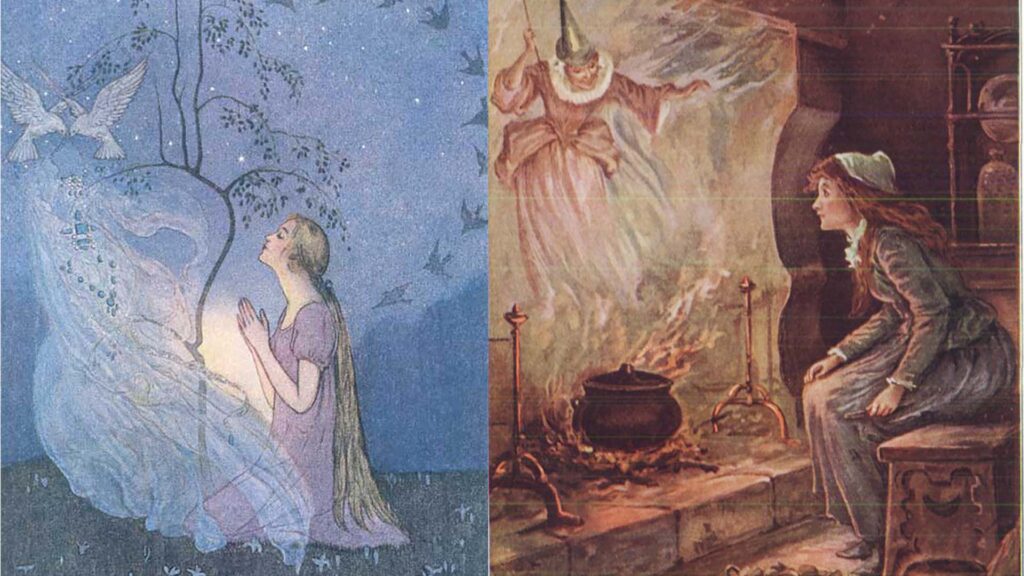
Then Mjaðveig awoke, and all was as she had dreamt it.
Now it is told of the queen that she suspected Mjaðveig was still alive. She sent her daughter, on the sly, to pry about her. She went away and found Mjaðveig. She saw what a change had come upon her, and used all sorts of blandishments and crafty arts, to find out how this change had been brought about. She said to Mjaðveig: “Ill did my mother, in betraying you. I will share this exile with you, for we may be able to put things right when the king returns from his travel. But subsequently, we will share one and the same fate.”
Mjaðveig, albeit she disliked the maiden’s speech, was obliged to put up with this plan. After a while, the maiden lay down and soon made as if she had fallen asleep. When Mjaðveig thought she was soundly napping, she moved a little way from the sleeper, took the cloth, and began eating. Now the queen’s daughter had got what she wanted. Rushing up, she snatched the fabric out of Mjaðveig’s hands. She ran away homewards, with her booty, saying exultantly: “Never shall this meat be for Mjaðveig’s eating.”
Now Mjaðveig was little better off than before and, in her helplessness, wandered about without any design until she dropped off to sleep, overpowered by weariness.
Mjaðveig Gets Help Again
Then she had a dream again, wherein her mother came to her, saying: “You have done incautiously; but, as what is done cannot be helped, we will take things as they now stand, and you shall go straight down to the sea. You will find a tongue of land, stretching out into the waves, joined to the land by a narrow pass. On this tongue of land, you will find a small house, locked but with the key standing in the door. Then you shall go three times forward and three times backwards around the house, touching the key each time as you pass by. If you do this, the house will open at the last touch of the key, and there you shall dwell for a while, and you will not find it a wearisome sojourn; for: —
“There cuckoos sing,
There onion spring,
There are wethers shed their covering.”
Now Mjaðveig awoke and went the way she had been pointed out in the dream. When she reached the end of her journey, she found and did everything just as her mother had bidden her. And in her new abode, each day was happier than the last. But it happened once, as she had gone into the country for her pleasure, that she saw many ships sailing along the coast and steering towards the harbor. At this sight, she became so frightened that she ran home to her house as if for her life; so fast she ran that one of her shoes got loose, and she lost it in her running. This shoe of hers was of gold.
The Prince Arrives
The leader of this fleet was a prince who came into these realms to woo Mjaðveig, the daughter of Máni, to become his wife. When he had disembarked and started to the town, he found on his way a woman’s golden shoe. It was so delicately shaped that he made a vow only to marry the lady whom the shoe was found to fit. Now he went to the king’s palace and asked for Mjaðveig, daughter of Máni, to be his wife. He added that he had made a vow never to marry any lady but that one whom the golden shoe should fit.
The queen asked the prince to favor her with a sight of the shoe. He did so, and when she saw it, she said: “Oh! I know that shoe very well: it was lost by Mjaðveig, my daughter, once, when she was out walking — a fault young people are very apt to commit.”

Then she went to her daughter and, in another room, told her about the prince and his vow. So, the maiden began trying the shoe on but squeezing and thrust as much as she would; half of her foot was left out of the shoe, and getting it in was out of the question. Then the queen cut her daughter’s heel and toes off and got the shoe on.
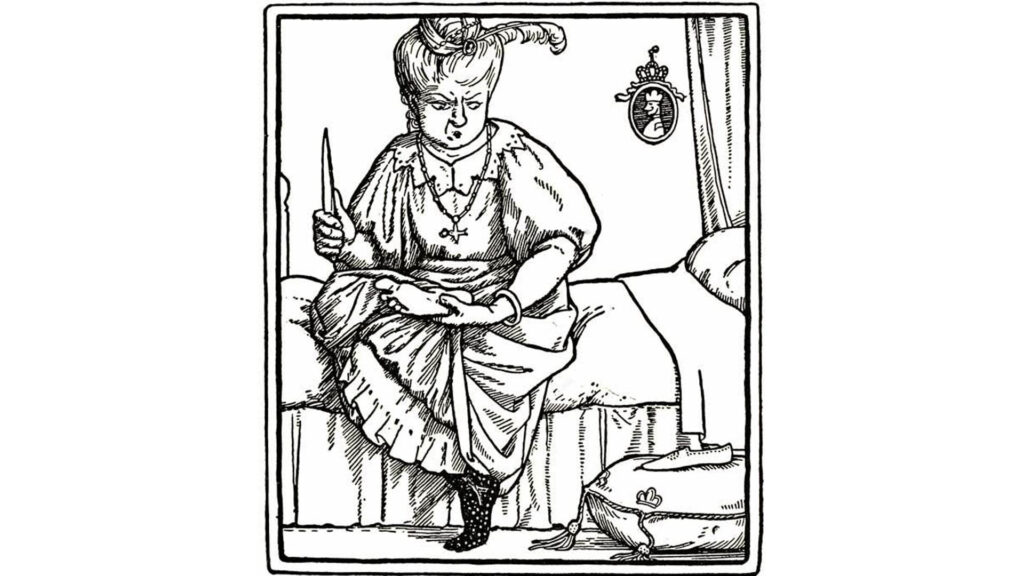
This treatment the daughter found rather unmotherly. But the queen told her that she had to suffer this for a great boon, the marriage with the prince. Then she dressed her in the gayest attire and presented her to the prince in the palace, showing him that the shoe fitted, which the prince did not doubt, as it was on the princess’s foot.
Sailing Away
Then the prince wooed, in form, Mjaðveig (as he thought) daughter of Máni and got everybody’s full leave. The prince would take his bride to his own country and said he would come again to invite people to his wedding feast.
But as he passed by the place where stood the house of the real Mjaðveig, the king’s daughter, he heard a great sound of birds chirping together. Being himself a good scholar in the language of birds, he began to pay heed now to their chirping. And the meaning of what they chirped was this: —
“Heel-chopped-off site in the stern,
And full of blood is her shoe.
Here, on the seaside, does Mjaðveig abide,
A far better bride to woo.
Turn back then. King’s son; O turn!”
At first, he would not believe this bird chatter. But when he began to look into the thing, he found that the birds had told the bare truth of the lady he had on board.
Then the prince took a spell-dissolving plate and put it on her shoulders. At once, she turned into a huge and ugly troll. It was now forced to tell the whole story of herself and her mother’s guile. After this, he killed her, took the body, and salted it down, the flesh filling no less than twelve barrels. He put this cargo upon one of the vessels with no freight on board save some gunpowder.
The Prince and Mjaðveig Meet
Then he launched a boat into the sea and, rowing ashore, found the little house. The birds told him how to open it. When he had done so, he found a maiden of outstanding beauty and asked her name. She answered that her name was Mjaðveig and that she was the daughter of King Máni. She added that she had fled to this lone place because of her stepmother’s cruelty.
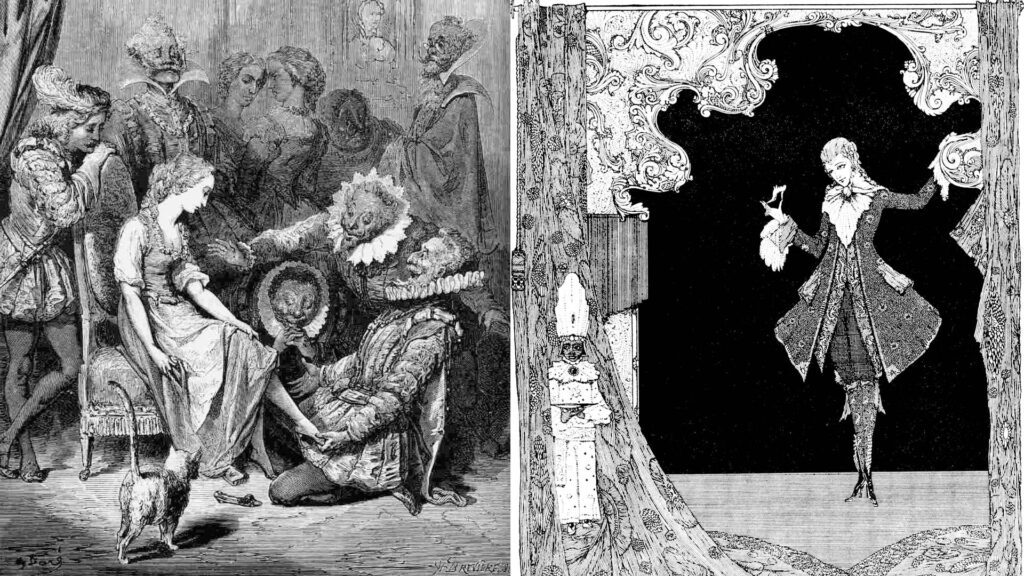
The prince now told her all his history. What he had done with his bride: he also took forth the shoe and, trying it on Mjaðveig’s foot, found, not only that it fitted, but that she had another golden shoe to match.
The prince found himself affianced to this lady by virtue of his vow. By her consent, he took her on board his vessel. They went, on the sly, with his ships into a hidden firth of the sea, where he retired awhile. After that, he sailed into the capital’s harbor, went to the king’s palace, and bade him, together with his queen, to his wedding.
The king received the invitation gladly, but not so did the queen. She excused herself on the plea of being unaccustomed to the sea. She would rather stop at home than undertake so long a sea voyage. But the prince so explained to the queen how glad her daughter would be if she came herself that she finally yielded to his showings and promised to come.
A Royal Trip Out at Sea
Now all the king’s family drove in royal carriages down to the shore and embarked and put to sea.
The queen was so sullen on the voyage that she paid no heed to anybody. The prince went to her secretly and begged her to tell him the cause of her grief. She showed great shyness and unwillingness to talk about this matter but at last spoke. She said: “My health is so strangely disordered that I can never eat heartily at the usual meal-hours: the cause of this I deem to be seasickness. Now I would like that you should help me out of this strait.”
The prince said he feared he had nothing to offer her that suited her taste and appetite. He said, however, that on one of his vessels was some salt meat to be had, but that being raw, it would hardly be of any use to her.
At this news, she brightened up and said she could quickly boil it herself; but she did not forget to beg the prince to be silent about these trifles.
Now the queen enjoyed the salted meat highly and was always the most hideous of trolls while eating the meat but changed her shape afterwards. This went on for eleven days. On the twelfth day, when she was devouring the twelfth barrel, the prince took King Máni with him, showed him the cannibal in her fiendish feast at the barrel, and told the king how often she had done this on the voyage.
When the king saw that he had thus been charmed by these trolls, he was astonished beyond telling. Now they set fire to the meat vessel while the troll-queen was yet on board it, and in a short time, it was blown into the air. Thus, the devilish troll found a speedy end after this.
A Royal Wedding
King Máni asked the prince how he had come to know these wonders. The prince told the king all about his discovery. Having taken him to Mjaðveig, recounted to him all the wiles of the trolls, which amazed the king even more. After that, they sailed away into the prince’s dominions. The wedding feast was held, and lasted a month. King Máni went away, honored with many gifts and precious things. He came home and governed his realm to a high age; henceforth, he is out of our tale.
Of the prince, we have to relate that he took the kingdom after his father. Then one year passed without aught important happening, save that Mjaðveig delivered a fair male child.
Not a Happy Ever After
Sometime after that, she went to the bath with one of her maidens. But when she came, she wanted soap and sent the servant home for it and waited in the bath alone.
Then there came to her a woman, who greeted her courteously, asking her to exchange dresses with her. This Queen Mjaðveig did.
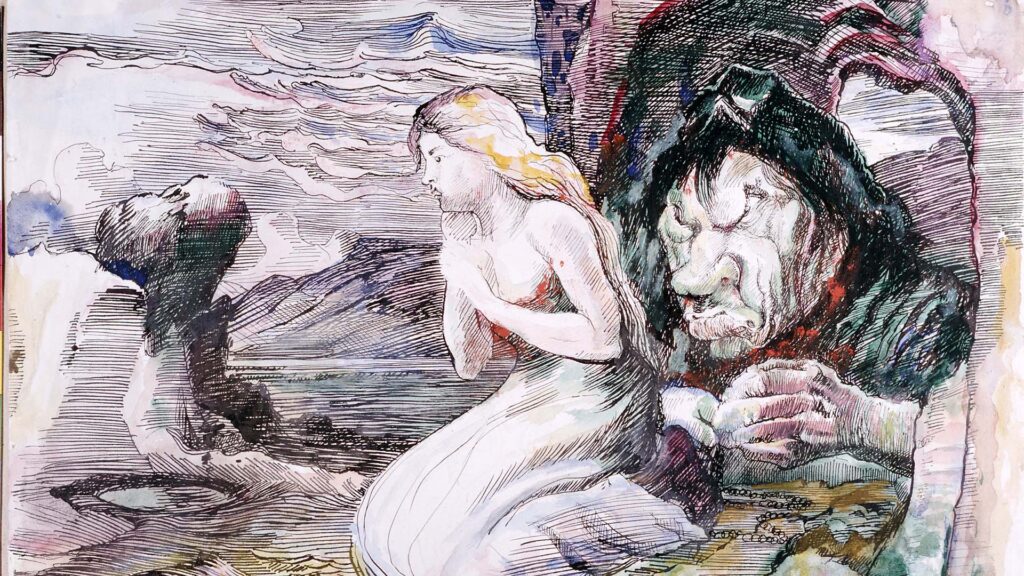
Then the woman put upon herself, by magic spells, all the mien and look of the queen who, in turn, was transformed into the woman’s shape and charmed away and vanished from that very hour. Nobody knew about this change. But a general dislike of the new queen prevailed after this, unsurprising when one thinks about who this new queen was.
Mjaðveig Missing Again
Now must we tell that, when the prince found Mjaðveig in her house on the tongue of land, he thought the house so charming that he could not do without it. He moved it away by his secret arts and placed it beside the queen’s hall. Here it was surrounded by the exact beautiful nature as before, and while all things went smoothly, and the real Queen Mjaðveig was there —
“Onions would spring.
And cuckoos would sing.
And wethers would shed their covering.”
But now, this change came to pass; —
“Onions would not spring.
And cuckoos would not sing:
And wethers would not shed their covering.
And the baby prince, as he lay
In his cradle, kept the peace, nor night, nor day.”
And everything in the kingdom, from that time forth, seemed to go wrong.
Daring Herdsman Helps
But, one day, it so chanced that the king’s herdsman was walking along the seaside. Suddenly he saw that a glass hall rose to the top of the water, from beneath some steep rock. Inside it was a woman who was so like queen Mjaðveig that the man could not tell them apart. Round this floating glass hall was an iron chain. The end of which was held by a hideous giant, who hauled all back into the deep after a while.
The herdsman was amazed and marveled much at the sight and went on, musing and pondering over it, till he came to a brook, and here he stopped in a trance of thought.
While he stood there, he saw a child coming to draw water from the brook. He gave the child a gold finger ring. It was incredibly pleased with the gift and soon disappeared into a rock that stood hard by.
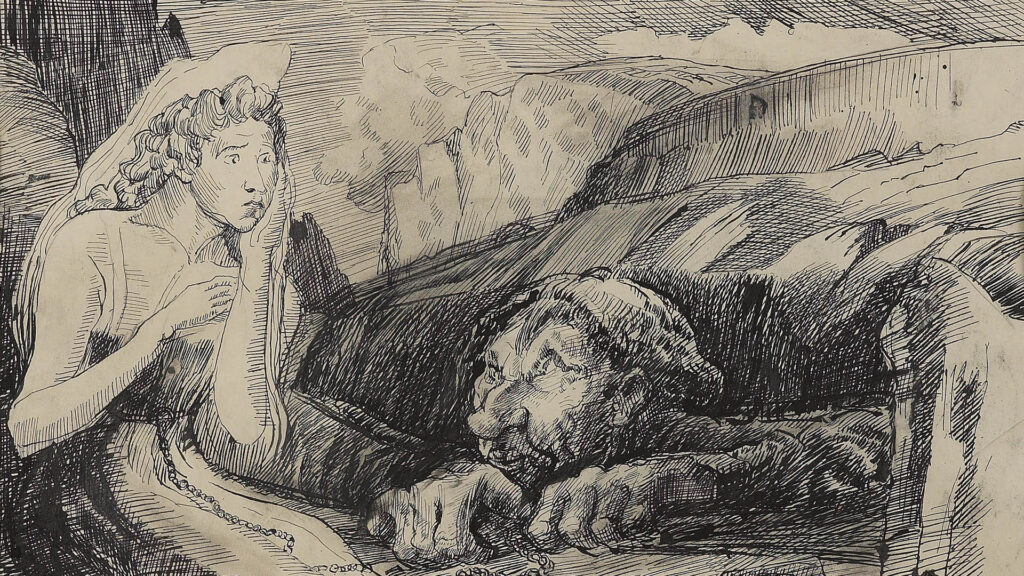
Immediately afterwards, out came a dwarf. He greeted the man and thanked him for his kindness to his child and asked what he would wish him to do for him in return. The herdsman begged him to explain what he had seen coming up to the surface of the sea from beneath the steep rocks.
The dwarf said it was queen Mjaðveig, charmed thither by evil trolls. But a giantess, sister to the giant whom he had seen holding the end of the chain, had taken Mjaðveig’s place at the court. The dwarf said, furthermore, that the giant had yielded to Mjaðveig’s entreaties. Allowing her to come on shore four times. The troll had promised her that she should be released from her bondage if she should be so lucky as to find somebody to release her. “But,” added the dwarf, “she has already been three times on land. And tomorrow she conies ashore for the fourth and last time.”
Now the man asked the dwarf to give him good advice on releasing the queen from her horrible bondage. The dwarf gave him an ax and told him to cut the chain with it when the glass-room should come up to the land the next day.
Mjaðveig is Saved
So, the man waited on the same stone the whole night. Then he went to the place where the glass case was wont to come on land. And, after a little while, up it came to the edge of the sea rocks. The man lost no time using his ax and easily cut through the chain. But no sooner had he cut through the chain than the giant came up in a wild rage. Ready to slay him who had dared to break his chain.
But then came the little dwarf, with a small bag, the contents of which he flung into the giant’s face. This at once made him blind, and as he writhed and twisted with the pain of the dust, he rolled over the edge of the rocks, into the sea, and died.
After this, they took Mjaðveig to the stone, where the dwarf dwelt, and here she stayed while the dwarf and the herdsman went home to the town.
The King’s Mighty Wroth
When they got there, they put a magic board across the shoulders of the supposed queen. At once, she turned into an ugly giantess and was put in prison and made to tell the story of her life. She then told how she had dealt with Mjaðveig and where the abode of her giant brother was, adding that king Máni’s latter queen had been their sister. “This was the reason,” she said, “that I did this to Mjaðveig. So, that I might have vengeance on her.”
At this, the young king was mighty wroth and had the monster shamefully killed.
Happy Ever After
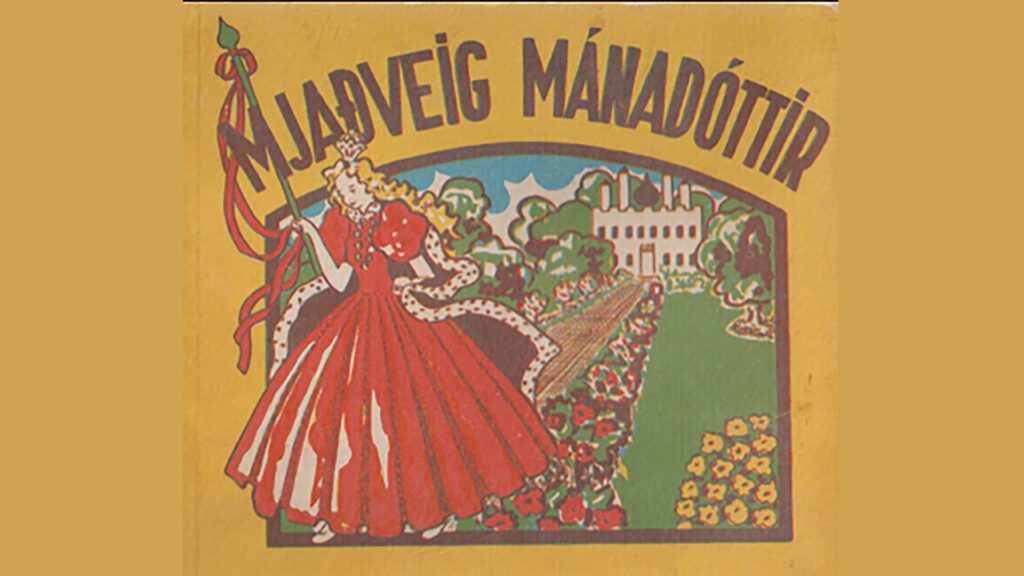
Now the herdsman came to the king and asked what he deemed his need to be, who might save Mjaðveig from her magic spells. The king said: “I would reward him with much wealth, with an earl’s title, and with a goodly share of my realm, to rule over.”
Hearing this, the herdsman was not long in fetching the queen and giving her back to the king, her loving husband. There was then, at court, greater joy than words can tell. When the queen had come back: —
“Cuckoo would sing.
Onion would spring.
And wethers would shed their covering.
And the baby prince, as he lay
In his cradle, kept peace, both night and day.”
From this time forth, the queen lived happily to a high age. The herdsman was duly rewarded. And here ends the tale of Mjaðveig, daughter of Máni.
And so ends the tale of the Icelandic Cinderella, Mjaðveikg Mánadóttir.
Please signup HERE for our newsletter for more fun facts and information about Iceland!









